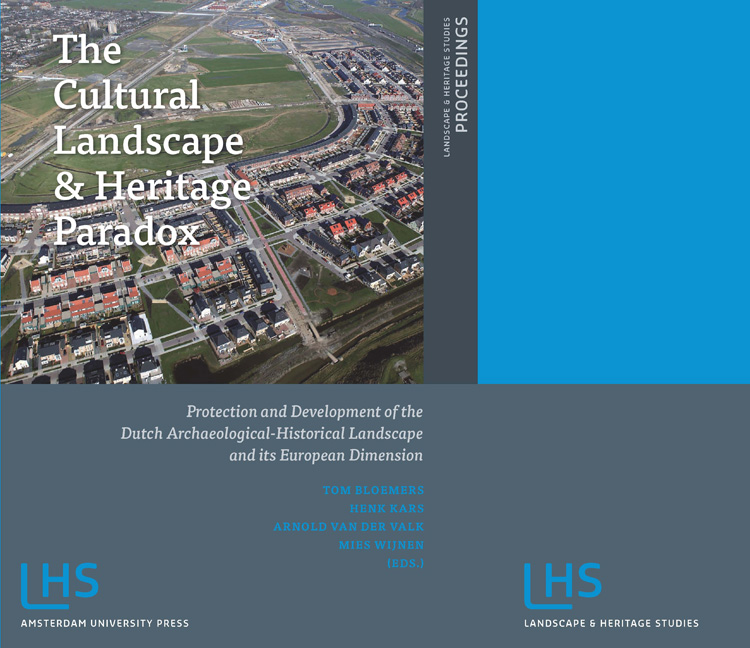 The Cultural Landscape and Heritage Paradox
The Cultural Landscape and Heritage Paradox Book contents
- Frontmatter
- Contents
- Preface
- I INTRODUCTION
- II INSIGHTS AND PROSPECTS OF ARCHAEOLOGICAL-HISTORICAL LANDSCAPE STUDIES
- III LINKING KNOWLEDGE AND ACTION
- IV IMAGINATION - FACTS AND CONSTRUCTIONS
- V SHARING KNOWLEDGE - STORIES, MAPS AND DESIGN
- VI SYNTHESIS AND CONCLUSIONS
- VII MANAGEMENT OF KNOWLEDGE
- VIII AGENDA FOR THE FUTURE
- IX SUMMARY
- X APPENDIX
- Subject Index
- Index of Places and Regions
3 - LANDMARKS. A Project based on Transnational and Interdisciplinary Scientific co-Operation
Published online by Cambridge University Press: 21 January 2021
- Frontmatter
- Contents
- Preface
- I INTRODUCTION
- II INSIGHTS AND PROSPECTS OF ARCHAEOLOGICAL-HISTORICAL LANDSCAPE STUDIES
- III LINKING KNOWLEDGE AND ACTION
- IV IMAGINATION - FACTS AND CONSTRUCTIONS
- V SHARING KNOWLEDGE - STORIES, MAPS AND DESIGN
- VI SYNTHESIS AND CONCLUSIONS
- VII MANAGEMENT OF KNOWLEDGE
- VIII AGENDA FOR THE FUTURE
- IX SUMMARY
- X APPENDIX
- Subject Index
- Index of Places and Regions
Summary
ABSTRACT
Action COST A27 LANDMARKS has been a successful attempt at establishing an effective transnational interdisciplinary project around the theme of landscapes. Running from 2004 to 2007, and coordinated from Madrid, A27 has proven extremely fruitful: 17 conferences and workshops, 13 edited publications. The best result, however, has been the establishment of working networks across fields and national borders.
In this chapter we revise the scientific environment in which this project was conceived and generated, as well as the internal organisation it adopted. Our intention, though, is not to congratulate ourselves for our good work. We want to go over the important challenges faced, how they were met, and what lessons can be learned for future collaborative European projects.
In order to achieve transnational and interdisciplinary integration, the internal structure of the project was organised around objectives and work packages which required side-by-side collaboration. Some problems, though, were encountered, particularly relating to the different degree of involvement of different partners, which tended to be self-defeating. Another problem is the lack of visibility of that research given the nature of COST publishing.
In conclusion, landscapes as a theme are a good way to push interdisciplinarity and transnationality forward in a field which is still being created and which requires these two to be in full swing.
KEY WORDS
LANDMARKS, landscapes, heritage; European collaborative projects; interdisciplinarity, transnationality
INTRODUCTION
LANDMARKS was conceived as a scientific co-operation project with two converging lines of interest, sharing research experiences and expertise on the historical dimension of cultural landscapes and generating tools based on that knowledge that would assist their management and foster the dissemination of scientifically-based programmes. That is why the participation of academic institutions was combined with administrative bodies and local/regional development organizations. In this way the project intended to extend the knowledge of the past into today's management strategies with a keen interest in preserving landscapes threatened by the abandonment of traditional lifestyles. Both approaches were part of one unified project and they were not hierarchically articulated but designed as complementary and interdependent facets of the collective research activity.
- Type
- Chapter
- Information
- The Cultural Landscape and Heritage ParadoxProtection and Development of the Dutch Archaeological-Historical Landscape and its European Dimension, pp. 545 - 556Publisher: Amsterdam University PressPrint publication year: 2010
- 1
- Cited by


